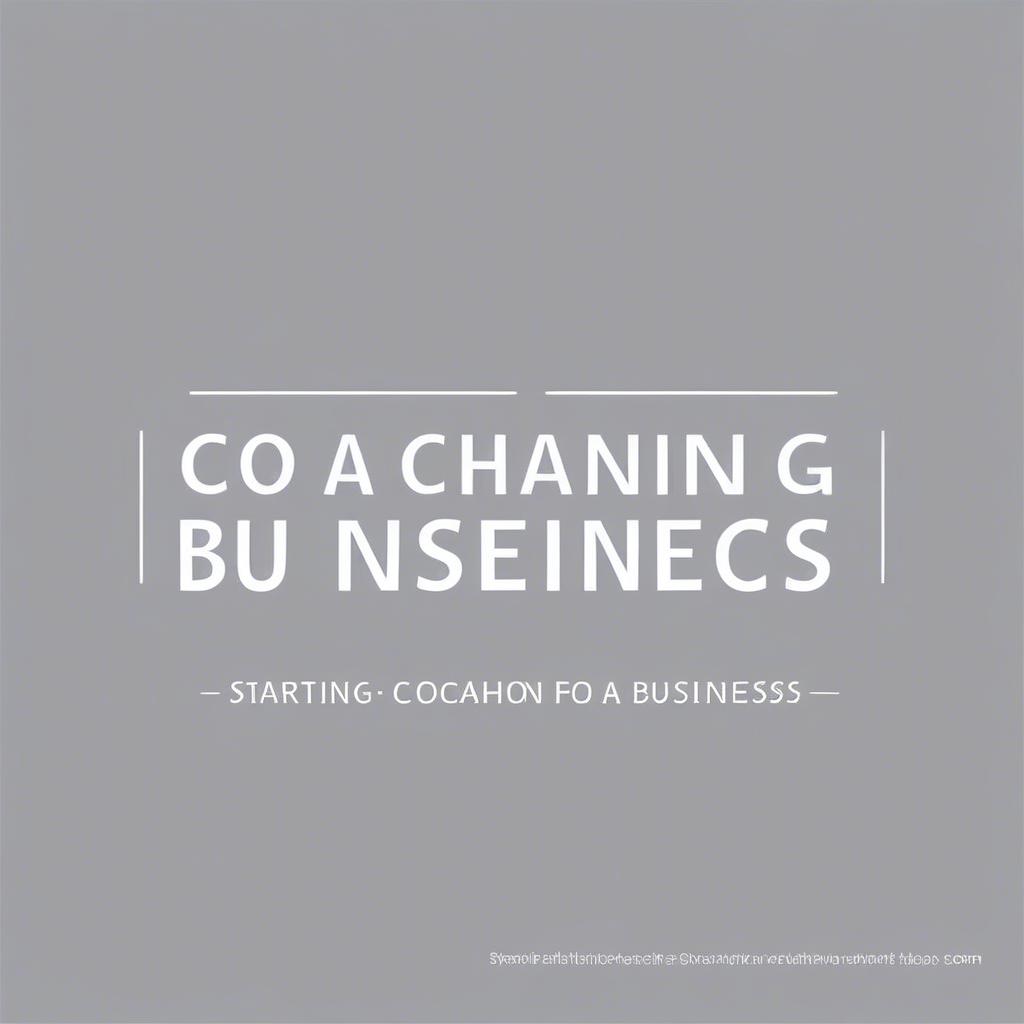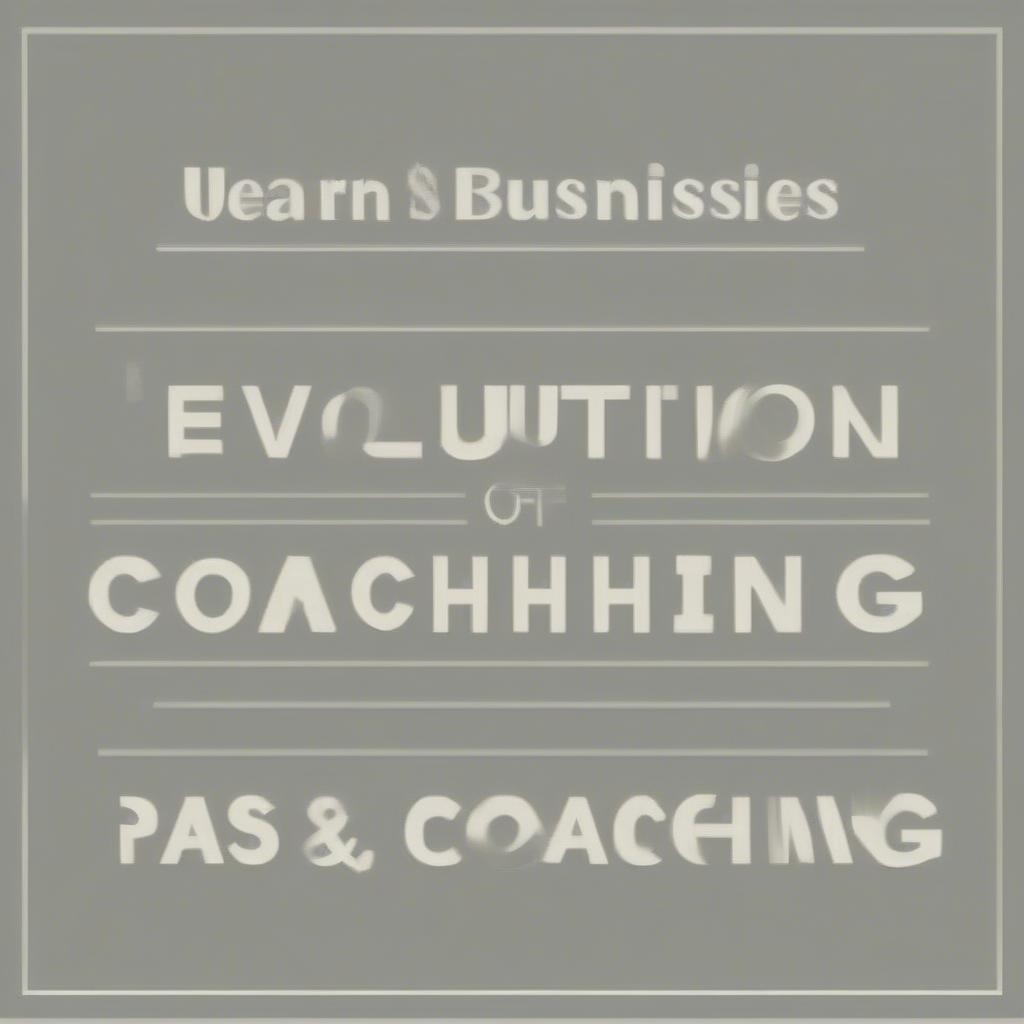
Starting a Coaching Business for Creative Professionals: A Comprehensive Guide
Are you a creative soul with a knack for guiding others? Do you dream of turning your passion for art, design, writing, or music into a fulfilling and profitable coaching business? If so, you’re in the right place. This guide will walk you through every step of starting a creative coaching venture, from defining your niche to attracting your ideal clients. We’ll delve into the “what,” “why,” “when,” and “how” of building a thriving coaching startup specifically tailored for creative professionals. Let’s unlock your potential to empower fellow creatives!
Why Focus on Creative Professionals? The Untapped Potential
Before we dive into the nitty-gritty, let’s explore why focusing on creative professionals is such a compelling opportunity. The creative world is often a landscape of passion, talent, and… well, a healthy dose of chaos. Many creatives are brilliant at their craft but struggle with the business side of things. This is where you, as a creative coach, can step in and provide invaluable support.
The Unique Challenges Creative Professionals Face
Creative professionals often grapple with unique challenges that traditional business coaches might not understand. These include:
- Imposter Syndrome: The constant comparison and self-doubt that often plague artistic endeavors.
- Lack of Business Acumen: Many creatives are skilled in their art but lack experience in marketing, finance, and sales.
- Overwhelm and Burnout: The pressure to constantly create can lead to exhaustion and a loss of passion.
- Difficulty Pricing and Valuing their Work: Many creatives struggle with confidently charging what their work is worth.
- Finding Clients and Building a Sustainable Practice: Navigating the freelance world and building a consistent client base can be daunting.
By addressing these specific challenges, you can establish yourself as a sought-after expert in creative coaching, providing tailored solutions that truly resonate with your target audience.
Defining Your Niche: The Cornerstone of Your Coaching Business
One of the most crucial steps in starting any successful business, especially a coaching startup, is defining your niche market. Trying to be everything to everyone is a recipe for overwhelm and ultimately leads to stagnation. Specialization allows you to attract the right clients and establish yourself as an expert.
Why is Niche Important?
- Attracts Ideal Clients: When you focus on a specific group, you speak directly to their needs and challenges.
- Establishes Expertise: Specializing in a niche market makes you the go-to person in that area.
- Simplifies Marketing: You can tailor your marketing efforts to a specific audience, making your message more impactful.
- Increases Profitability: Clients are often willing to pay more for specialized expertise.
Identifying Your Specific Creative Niche
To determine your ideal niche market, consider the following:
- Your Own Experience: What creative field are you passionate about and have deep experience in? Do you have expertise in graphic design, writing, photography, music, or something else?
- Your Ideal Client: What kind of creative professional do you enjoy working with? Are they freelancers, entrepreneurs, or corporate employees?
- Pain Points: What specific challenges do these creatives face? What solutions can you offer?
- Market Demand: Is there a need for the type of coaching you want to provide?
- Profitability: Can you create a sustainable and profitable business within your chosen niche?
Examples of Niche Markets in Creative Coaching
- Coaching for Graphic Designers on Branding and Marketing: Helping designers build their own brands and attract more clients.
- Coaching for Writers on Overcoming Writer’s Block: Guiding writers through creative blocks and helping them produce consistent content.
- Coaching for Photographers on Business and Pricing: Teaching photographers how to run their businesses profitably and set fair prices.
- Coaching for Musicians on Performance and Promotion: Assisting musicians in improving their performance skills and promoting their work.
- Coaching for Fashion Designers on Sustainable Practices and Brand Building: Guiding fashion designers in developing sustainable practices and creating a strong brand identity.
By thoroughly defining your niche, you will lay a solid foundation for your creative coaching venture.
Structuring Your Coaching Programs: From Concepts to Creation
Once you’ve identified your niche market, you’ll need to develop structured coaching programs that deliver real value to your clients. This involves designing your offerings, determining your delivery methods, and setting your prices.
Types of Coaching Programs
- One-on-One Coaching: Personalized sessions tailored to the individual needs of your client.
- Benefits: Highly customized support, deeper engagement, and faster progress.
- Example: A 6-month program focused on helping a freelance illustrator develop their business strategy.
- Group Coaching: Coaching sessions delivered to a small group of clients.
- Benefits: Cost-effective for clients, fosters community, and allows for peer-to-peer learning.
- Example: A 12-week course for photographers on how to master social media marketing.
- Mastermind Groups: Peer-led group coaching focusing on goal-setting and accountability.
- Benefits: Community support, shared insights, and mutual encouragement.
- Example: A mastermind group for freelance writers to support each other in achieving their writing and business goals.
- Online Courses: Self-paced learning modules delivered online.
- Benefits: Scalable, passive income stream, and can reach a wide audience.
- Example: An online course for musicians on how to record and produce their own music.
- Workshops and Webinars: Focused, short-term events that provide specific knowledge and skills.
- Benefits: Can quickly generate revenue, promote your coaching services, and engage a larger audience.
- Example: A 2-day workshop for graphic designers on how to use specific design software efficiently.
Structuring Your Coaching Sessions
- Set Clear Objectives: Each session should have a clear objective that aligns with the client’s overall goals.
- Prepare an Agenda: Use a structured agenda to ensure the session stays focused and productive.
- Active Listening: Listen carefully to your clients and ask clarifying questions to fully understand their needs.
- Offer Actionable Advice: Provide specific, actionable strategies and tools that clients can implement immediately.
- Provide Feedback: Give constructive feedback to help clients learn and grow.
- Follow Up: Send session summaries and action plans to keep clients engaged and accountable.
Pricing Your Coaching Services
Pricing your services is a crucial part of any coaching startup. Research your competition, consider your experience level, and the value you provide.
- Hourly Rate: Charge a set fee for each hour of coaching.
- Package Pricing: Offer a bundle of coaching sessions at a discounted rate.
- Value-Based Pricing: Charge based on the value you deliver to your clients, not just your time.
- Subscription Model: Offer monthly coaching subscriptions for ongoing support.
Building Your Brand and Attracting Clients: Marketing for Creative Coaches
Now that you have developed your creative coaching programs, it’s time to get the word out. Building your brand and attracting clients are essential for the success of your business. This requires a well-thought-out marketing strategy.
Creating Your Brand Identity
Your brand is more than just a logo; it’s the essence of your business. It represents who you are, what you stand for, and how you want to be perceived.
- Define Your Brand Voice: What personality do you want your brand to have? Professional, friendly, inspiring, or something else?
- Design Your Visuals: Create a cohesive visual identity, including a logo, color palette, and typography that reflects your brand.
- Craft Your Story: Share your journey, your values, and why you are passionate about helping creative professionals.
Effective Marketing Strategies for Creative Coaches
- Content Marketing: Create valuable and engaging content such as blog posts, articles, videos, and podcasts.
- Topics: Share your expertise on topics relevant to your niche market, such as overcoming creative blocks, pricing your services, and building a sustainable business.
- Social Media Marketing: Use social media platforms to connect with potential clients and build your brand.
- Platforms: Identify the social media platforms where your ideal clients spend time.
- Strategies: Share valuable content, engage with your audience, and use relevant hashtags.
- Email Marketing: Build an email list and nurture leads with valuable content and offers.
- Strategies: Create a lead magnet to attract subscribers, such as a free guide or checklist.
- Networking: Attend industry events, join online communities, and collaborate with other professionals.
- Strategies: Connect with potential clients, partners, and mentors.
- Guest Speaking: Offer to speak at events or podcasts to share your expertise and reach a wider audience.
- Strategies: Prepare engaging presentations that highlight your knowledge and passion.
- Testimonials and Case Studies: Share client success stories to demonstrate the value of your coaching services.
- Strategies: Collect testimonials from happy clients and create case studies highlighting specific results.
- Search Engine Optimization (SEO): Optimize your website and content to rank higher in search engine results.
- Strategies: Research relevant keywords related to creative coaching and niche markets, and incorporate them into your website and content.
By implementing a comprehensive marketing strategy, you can effectively reach your target audience and attract the ideal clients for your creative coaching business.
Essential Tools and Resources: Setting Up for Success
To run a successful coaching startup, you need the right tools and resources to streamline your operations and deliver high-quality service to your clients.
Software and Platforms
- Website Builder: Squarespace, Wix, or WordPress to create a professional website.
- Scheduling Tool: Calendly, Acuity Scheduling, or ScheduleOnce to manage appointments.
- Video Conferencing: Zoom, Google Meet, or Skype for virtual coaching sessions.
- CRM Software: Client Relationship Management software like Dubsado or HoneyBook to manage client information and communication.
- Email Marketing Software: Mailchimp, ConvertKit, or ActiveCampaign to build your email list and nurture leads.
- Project Management Software: Asana, Trello, or Monday.com to manage client projects and tasks.
- Payment Processing: PayPal, Stripe, or Square to process payments securely.
- Online Course Platform: Thinkific, Teachable, or Podia to host and sell online courses.
Resources for Creative Coaches
- Books and Articles: Stay up-to-date on industry trends and best practices by reading books and articles on coaching, business, and creativity.
- Coaching Certifications: Enhance your credibility by obtaining relevant coaching certifications.
- Mentorship Programs: Seek guidance from experienced coaches and business owners.
- Online Communities: Join online communities and groups for creative professionals to network, learn, and collaborate.
- Templates and Worksheets: Develop templates and worksheets that clients can use to enhance their learning experience.
Learn Business: Empowering Your Coaching Business with Proven Resources
At Learn Business, we understand the unique challenges and opportunities that come with starting a coaching startup, especially for creative professionals. We are dedicated to supporting your journey by providing a range of invaluable resources, tailored guidance, and practical templates.
How Learn Business Supports Creative Coaching Businesses
- Business Plan Templates: Our comprehensive business plan templates are specifically designed to help you structure your creative coaching business, define your target audience, outline your services, and project your financials.
- Marketing Plan Templates: Create a robust marketing strategy with our ready-to-use marketing plan templates. These templates help you identify the best marketing channels for your business and develop a strategy to effectively reach your ideal clients.
- Client Onboarding Templates: Streamline your client onboarding process with our professional and efficient onboarding templates. These ensure a smooth and organized start to every coaching engagement.
- Session Templates: Our session plan templates will guide you in structuring engaging and impactful coaching sessions.
- Financial Templates: Gain control of your business finances with our easy-to-use templates for budgeting, invoicing, and tracking expenses.
- Access to a Community of Like-Minded Entrepreneurs: Connect with other coaches and business owners, share your experiences, and learn from each other within the Learn Business Community.
- Expert Guidance: Our team of experienced professionals provides ongoing support and mentorship to help you navigate the challenges of starting and growing your business.
Learn Business provides you with the tools and resources you need to focus on what you love most: coaching and helping others.
Navigating the Challenges: Common Pitfalls and How to Avoid Them
Starting a coaching startup can be challenging, and it’s important to be aware of the common pitfalls that can hinder your progress. Here are some common challenges and strategies to overcome them.
Challenges and Solutions
- Lack of Focus: Spreading yourself too thin by trying to serve too many niches.
- Solution: Define your specific niche market and focus your efforts on serving that audience.
- Pricing Issues: Undervaluing your services and struggling to charge what you’re worth.
- Solution: Research your competition, consider your experience, and price your services based on the value you provide.
- Inconsistent Client Base: Fluctuating client demand and difficulty maintaining a steady income.
- Solution: Implement a robust marketing strategy and build a strong client pipeline.
- Burnout: Working long hours and struggling to maintain a healthy work-life balance.
- Solution: Prioritize self-care, set boundaries, and delegate tasks when possible.
- Lack of Confidence: Doubting your abilities and struggling to promote yourself effectively.
- Solution: Practice self-compassion, focus on your strengths, and celebrate your achievements.
- Poor Time Management: Struggling to manage your time effectively and meet deadlines.
- Solution: Use scheduling tools, prioritize tasks, and break down large projects into smaller, manageable steps.
- Resistance to Sales: Feeling uncomfortable with the sales process and struggling to attract clients.
- Solution: Reframe sales as a process of helping people and focus on the value you provide.
By anticipating and addressing these common challenges, you can set yourself up for success and build a thriving creative coaching business.
Launching Your Coaching Business: A Step-by-Step Guide
Now that we’ve covered the critical elements of starting a creative coaching business, let’s bring it all together with a practical step-by-step launch plan:
- Define Your Niche: Clearly identify your niche market and ideal client.
- Develop Your Coaching Programs: Create structured coaching programs that deliver real value to your clients.
- Set Your Prices: Determine your pricing strategy, considering your experience, value, and the market.
- Brand Your Business: Develop a professional brand identity that reflects your values and personality.
- Build Your Website: Create a user-friendly website that showcases your services and attracts your ideal clients.
- Implement a Marketing Strategy: Choose the marketing channels that work best for you and start attracting clients.
- Set Up Your Tools: Integrate the necessary software and platforms to streamline your operations.
- Launch and Iterate: Start coaching clients, gather feedback, and continuously improve your services.
- Utilize Learn Business: Use Learn Business’s Templates and Guidance to support your journey.
Conclusion: Your Journey to Empowering Creative Professionals Starts Now
Starting a creative coaching business is an exciting and rewarding journey. By focusing on a specific niche market, developing structured coaching programs, building your brand, and leveraging the right tools and resources, you can create a thriving business that empowers creative professionals to achieve their full potential. Remember to utilize the resources provided by Learn Business to accelerate your growth and set your business up for long-term success.
The world needs your expertise and your passion. Take that first step today, and start making a positive impact on the lives of creative individuals. You have what it takes to build a successful coaching startup and become a leader in the world of creative coaching. Let your journey begin!



Leave a Reply